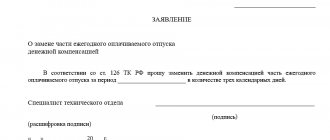The rights and obligations of employees are regulated by the Labor and Civil Code of the Russian Federation. And systematic and gross violations by the employer must be accompanied by employees’ appeal to the relevant regulatory authorities.
In this article we will try to answer the following questions: what is considered a violation of workers' rights? Where to go if an employer violates an employee’s rights? What penalties can be applied to an employer who violates the rights of his subordinates?
What can be considered a violation of an employee’s labor rights?
The following may be considered a violation of an employee’s labor rights by the employer:
- exceeding one's official powers , which can be expressed, for example, in forcing an employee to perform work that is not included in the list of his job responsibilities;
This may also include disrespectful communication, shouting, exerting psychological pressure, forcing people to work overtime, etc.
- disrespectful attitude towards the employee’s work (“prolonged” internship without pay, unreasonable removal from work, fines);
- unreasonable dismissal;
Read about what to do if you want to be fired here.
- irregular wages;
This also includes constant delays in wages, non-additional payments, deductions, fines, and deprivation of well-deserved bonuses.
- non-contractual form of cooperation;
When an employer hires an employee first as a trainee, promising to subsequently conclude an employment contract. However, this never happened.
- refusal to provide sick leave, vacation or time off;
- other unlawful actions or inactions of the employer that create a negative working atmosphere for the employee’s work;
Get team support
The last advice will be so everyday, but we cannot do without it. It consists of the following: remember that no one likes brawlers. That is, there is no need to show off your knowledge of the law and talk to your boss in such a way, they say, “if you try to fire me under the article, I will cause such problems for you!”
Remain calm and whenever they want to punish you for something, simply politely and correctly ask management to explain the meaning of their actions, the basis on which you are being held accountable.
Don’t turn the team against yourself, this is completely unprofitable for you, let everyone see that you are a normal, adequate person, and only the boss is wrong here.
Even if, for obvious reasons, none of your colleagues dare to openly stand up for you, at least your colleagues will be on your side. This is important because, in the end, if you lose this fight and leave this place of work, already looking at your empty place, your colleagues will remember you with a kind word among themselves, and your reputation will follow you to a new place of work.
During this cold war with your superiors, at the same time, continue to conscientiously and regularly perform your job duties, work, be a punctual worker, and be less distracted by extraneous matters and conversations during working hours. This will make it clear to both the team and management that essentially there can be no complaints against you.
Where to contact?
If an employer violates an employee’s labor rights, contact one of the following authorities:
- Labour Inspectorate;
- Law enforcement agencies (prosecutor's office);
- Judicial authority;
When contacting one of the listed authorities, the employee must file a complaint against the employer, drawn up in any form or based on the established form.
Collective complaints (submitted by a group of employees), rather than individual complaints, are considered the most effective.
Read about the procedure for resolving collective labor disputes here.
Let's consider appealing to each of the authorities separately.
Anonymous complaint against employer
Filing an anonymous complaint against an employer to the prosecutor's office or State Tax Inspectorate is not permitted. But you can ask the regulatory authorities for non-disclosure of your personal data - this right is given by Art. 358 Labor Code of the Russian Federation.
To protect your privacy, submit a request for confidentiality along with your main complaint. It is written in free form, indicating the reasons why you do not want to disclose the fact of contacting the supervisory authorities. You can ask for non-disclosure of the inspector who is dealing with your problem.
Labour Inspectorate
If the employee is unable to resolve the violation of his labor rights during peaceful negotiations with the employer, then the next step is to contact the Labor Inspectorate.
The responsibilities of labor inspectors include:
- Monitoring compliance with the current standards of the Labor Code of the Russian Federation;
- Assignment of liability for violation of current norms of the Labor Code of the Russian Federation;
When contacting the Labor Inspectorate, the employee must make a written complaint.
You can make a complaint either in any form or according to the established form by downloading it on the Internet.
Sample complaint to the Labor Inspectorate.doc
You can contact the Labor Inspectorate either in person, by filing a written complaint, or through the official website of the territorial division of the Inspectorate. In addition, you can call TI using the hotline number listed on the website.
The completed complaint can be delivered to the Labor Inspectorate in one of the following ways:
- Personally;
Contacting the Inspectorate in person will not speed up the process of considering the complaint. Therefore, you should choose this method of delivering an application only if you want to consult with Labor Inspectorate employees on some labor issues.
- By post;
The complaint must be accompanied by documents confirming the labor violations listed in the complaint. Otherwise, the complaint will not be considered.
The period for studying the complaint is thirty days (starting from the date of receipt of the application).
The complaint must contain the following information:
- The name of the organization whose leader is accused of violating labor rights;
- Details of the manager himself (full name, position held);
- Details of the applicant (full name, position);
- Description of the reason for filing the complaint with legislative references (articles of the Labor and Civil Code);
- A list of documents attached to the complaint confirming the violations described;
If employees approve the complaint, the organization against which it was filed will be subject to a surprise audit. If the violations specified in the complaint are detected, the employer will be subject to such “punitive measures” as temporary suspension from the performance of his official duties, an administrative fine, etc. The employee's rights, on the contrary, will be restored.
Employees of the Labor Inspectorate do not often undertake to “do justice” and, if the situation is ambiguous, they refer the case to court.
However, if the Labor Inspectorate refuses, you should not immediately go to court. Before doing this, you should contact a law enforcement agency - the prosecutor's office.
Guilty without guilt
Often in organizations or at an enterprise, a situation arises when the employer does not formally violate labor laws, but creates such conditions for an employee he does not like that he wants to leave on his own.
Regardless of education, experience and position, anyone can encounter such an unpleasant factor.
This could be personal hostility, or the boss wants to make room for some “thieve,” and therefore he does his best to force the employee out of the organization, finds fault with every little thing, starts a conflict out of nowhere, and every day of the subordinate turns into a nightmare.
Let's consider those situations when the option of “just leaving” a tyrant boss does not suit us. Of course, if an employee could painlessly change jobs, then no one would make a problem out of it at all. Naturally, each situation is unique, but I hope the advice will be useful to you in some way.
Contacting the prosecutor's office
The Prosecutor's Office, as well as the Labor Inspectorate, monitors compliance with the employee's labor rights by the employer.
You can file a complaint against an employer with the prosecutor's office either individually (on behalf of one employee) or collectively (on behalf of a group of employees).
Sample of an individual complaint against an employer to the prosecutor's office.doc Sample of a collective complaint against an employer to the prosecutor's office.doc
After filing a complaint with materials confirming labor violations, law enforcement officials study them within thirty days and then make a decision.
As a result, the employer can expect the following penalties:
- Bringing to administrative responsibility;
- Involvement in disciplinary action;
If a labor dispute has to be resolved in court, an employee of the prosecutor's office may (at his own discretion) become involved in representing the interests of the employee.
It's not that easy to get fired
One might even say it is very difficult. In any case, it is not as simple as it seems to your superiors. No one has filed a lawsuit for reinstatement at work, and in court the burden of proving that you were fired legally falls entirely on the employer.
It is the employer who must prove to the court the legality of your dismissal, and then the court will get to the bottom of everything, and the employer will have to explain why all the big shots in the organization fell on one employee.
There is a whole stack of disciplinary orders against one employee, and the rest, it turns out that, white and fluffy, is everyone else really crystal clear? And what is this act of absence from work for 10 minutes, who signed it, why not in the form approved by the Ministry of Labor, where is the explanatory note, where the requirements for giving explanations are described, how it is confirmed that it was handed over, and so on.
In general, if the court reinstates the employee, the employer finds himself in an unenviable position, especially if he has already hired someone for this job.
Court
The court is the last and most effective authority for resolving labor violations.
It is important to take into account the statute of limitations, which is 3 months from the moment when the labor violation of the employee’s rights by the employer was recorded. “Fixation” can be considered the moment when the employee learned that his labor rights were violated.
If the violation of rights is the unlawful dismissal of an employee, the statute of limitations in this case is thirty days from the date of issuing an order to dismiss the employee or putting a corresponding mark in the work book .
If the statute of limitations has expired, the employee may file a claim only if he shows good cause explaining why the claim could not be filed within the time limit for filing.
When filing a claim for violation of an employee's labor rights, you need to consider the following information:
- The statement of claim must be filed at the address of the company where the applicant works, in the district court;
- The filing of a claim occurs in accordance with the requirements presented in Article 131 of the Civil Procedure Code;
If the claim is drawn up without taking into account the requirements of Article 131 of the Civil Procedure Code, it may not be accepted for consideration.
- If the employee does not have sufficient evidence of a labor violation due to lack of access to such information at work, the claim can indicate a requirement to request the necessary list of documents from the employer by court employees. The employer will definitely not refuse to provide them with the necessary documents;
- The period for studying the claim is five days. After which the employee receives notification of his satisfaction or refusal. If the claim is successful, a hearing date will be set;
Many labor disputes end at the stage of filing and satisfying a claim, when the employer realizes that “the truth” is not on his side.
Terrible revenge - a modern version
An employee of one of the private companies, Alexey, outraged by salary delays, nagging from his superiors and unfair dismissal, took revenge on his boss with creativity and scope.
He created profiles on the dating site of several social networks, posted there the boss’s personal information and photographs, and provided his real place of work and contact numbers. To make things even more painful, the offended employee announced his former boss’s non-traditional sexual orientation and even attached some videos, supposedly as proof.
He probably went too far in his desire to annoy his hated boss. The idea, of course, is brilliant: revenge is sophisticated, does not require costs, the target is struck inevitably and swiftly.
Alexey anticipated that the news would spread across the networks instantly, the boss would turn to the administration of the networks and sites with a demand to block fake accounts and urgently delete records. The administration, as usual, will react with a delay, and all this time the rumor will be buzzing, nerves will be spent, reputation will suffer, and friends and acquaintances will stay away. All this is true, but the boomerang can return to the author of the revenge action if his involvement can be proven. He shouldn't hope that they won't look too hard.
They will, and how! They will attract specialists, determine IP addresses, restore correspondence on social networks, and take any other measures. And if the author is identified and his guilt is proven, then this trick could cost him dearly.
He cannot avoid a lawsuit regarding honor, dignity and business reputation, demanding compensation for all types of damage caused. It won't seem enough! So was it worth starting all this without thinking about the consequences?
If the employer is wrong, it is, of course, not good to let him get away with it. But breaking the law in this case is categorically not recommended, because it is more expensive for yourself.








